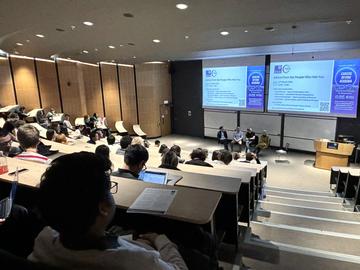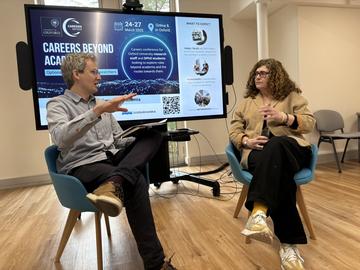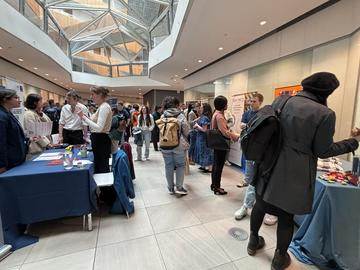Takeaways from the 2025 Careers Conference for Researchers

The 2025 Careers Beyond Academia conference for Oxford University research staff and DPhil students took place from Monday 24 March - Thursday 27 March, online and in Oxford. Spanning 23 events including insights into a variety of sectors, practical workshops, careers and employability tips, and networking opportunities with employers, peers, and careers advisers, the conference offered something for all researchers, whatever their career intentions.
During the week, the Careers Service team was supported by Oxford micro-interns: Noé Vagner-Clévenot, Kian Swingler, Yi Hao Wong, Xinran Huang, Matthew Jones, Alex Massie, and Enzo Wu. Here are their impressions of the conference and some tips and resources from the week.
Insights from our micro-interns
The Careers Conference featured a wide range of speakers including Oxford University careers advisers and Oxford alumni, and every single session I attended was extremely informative. - Noé Vagner-Clévenot
What struck me at the conference was how good all the speakers were at passing information concisely. They were also excellent at answering the many relevant and sometimes arduous questions asked by the audience who considerably enhanced every session. - Noé Vagner-Clévenot
Making the switch
The existence of a Careers Beyond Academia conference was surprising to me – the idea that these passionate intellectuals might want to move on from the field demanded further investigation. Having had the privilege of covering just under 10 discussion panels over the week as a content development intern, I was struck instead by the conviction with which speakers who had left Academia spoke about their new roles. It was clear that while the choice to switch industries may have been made for various pragmatic reasons, this did not render their subsequent jobs a “second best” alternative to scholarly life or a mere backup option. Not only have these other pathways been equally meaningful and engaging, many ex-academics continue to remain plugged into the life of the mind, finding ways to bridge their past and present professional networks and apply their scholarly skills and knowledge in other fields. Indeed, these were all careers beyond Academia, rather than careers after Academia. - Wong Yi Hao
Interesting areas
Attending talks on sectors that were previously unknown to me, such as one given by policy and think tank specialists, has given me a more rounded understanding of the sector and inspired me to take part in my own research in the industry, which I now feel would be a good fit for my current interests and skills. Equally, the conference has allowed me to narrow down my search, highlighting to me which parts of academia I hope to leave behind, a process recommended by speakers when considering how to smoothly transition from academia into a career of interest to DPhil students. - Matthew Jones
SESSION INSIGHTS: Mathew and Noé attended the Think Tanks and Policy Research session and noted that a career in think tanks and policy research is dynamic, intellectually stimulating, and impactful. A strong understanding of governments, think tanks, and public policy processes operate is useful for applying. Use resources such as Go-Science and think tank reports to gain insight into the sector, showing interest and builds relevant experience. While breaking into the field can be challenging, persistence, networking, and skill-building—particularly in communication and policy analysis—can significantly improve one’s chances. Connect with professionals on LinkedIn, attend policy-related events, and seek informational interviews. Many policy job opportunities are shared through word of mouth, specialist recruitment agencies, and internal networks, making this key to the job search strategy.

Surprisingly, I really enjoyed panels that were not directly related to my field of research (History), such as Careers in Clinical Research or Applying Maths and Modelling for Impact, because they contained a lot of useful information that applies to all DPhil students and researchers, regardless of their fields of study. - Noé Vagner-Clévenot
SESSION INSIGHTS: Enzo Wu attended the Careers in Clinical Research session and noted that there are many entry positions from DPhil to Careers in Clinical Research; one popular role is the Clinical Research Associate (CRA). The CRA role involves going onto the ground and observing and prepping a trial, checking for eligibility and compliance. There are many initial entry roles such as data manager and beyond.
Common themes
The growing prevalence of AI in job applications, from appliers and recruiters’ perspectives, is an interesting point of discussion, and the first talk spoke to this and how to best deal with AI’s newfound place in the job market. Limiting AI use to structuring cover letters to not lose the personal touch of an application stands out; so does using exact keyword phrasing in a CV, when dealing with AI scanners. Having been able to attend these discussions, I have a better awareness of the changing role of AI, and how it is important to stay curious and ask questions. - Matthew Jones
SESSION INSIGHTS: Alex and Matthew attended the Keynote on the State of the Job Market and the Role of AI in Recruitment and noted that collaboration is at the heart of everything we do—building and maintaining strong relationships with colleagues is essential for staying connected and being an effective team player. As AI becomes more integrated into our work, human connections are more important than ever for remaining adaptable, engaged, and impactful.
The main message that stood out from all panels was that DPhil students and researchers possess so many transferable skills, including resilience, data analysis, project management, communication, and writing skills. I felt this clearly applies to me as I just finished my DPhil, and it made me more confident about my capabilities. Watching panellists talking so enthusiastically about their job can only motivates you to try to follow their footsteps. A career path is never straight - as we were reminded multiple times - especially with the current state of the job market, but the conference certainly gave me reasons to be hopeful. - Noé Vagner-Clévenot
Perhaps most importantly, the theme common to the vast majority of the talks which I attended was the use of LinkedIn not only as a tool for connecting, but also for job searching and alumni research. Learning these LinkedIn skills has already proven to be useful, and I look forward to carrying forward these techniques into my future research and applications. Certainly having access to a wide range of information easily which directly translates to personal job interests has been beneficial to me, and even more so to those studying for the DPhil. - Matthew Jones

Plan ahead and ask for help
As a corollary, the importance of planning ahead, exploring unconventional options, and proactively reaching out to contacts for advice was impressed upon me – all of which enabled many of the speakers (and indeed, anyone looking for a new job) to find new opportunities aligned with their strengths and values when the time came. To this end, I came away with the conference with a deeper appreciation for the vital work of the Careers Service in continually future-proofing the professional lives of members of the University, regardless of whether they may be actively seeking greener pastures or just keeping up to date with sectoral trends. - Wong Yi Hao
Conference for researchers information booklet 2025
For more, read the conference booklet for a recap of this year’s sessions, inspiring guest speakers, and information on organisations actively recruiting researchers.




